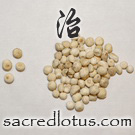Ban Xia (Pinellia Rhizome)
Herb 4 of 9 in Warm Herbs that Transform Phlegm-Cold
Buy This Herb
Get free shipping from
our partners at CHD
our partners at CHD
Chinese Herb Actions
-
Dries Dampness and Resolves Phlegm
For conditions where the Spleen can not properly transform damp and phlegm, it then accumulates in the Lungs with symptoms such as cough with profuse sputum. - Descends Rebellious Stomach Qi and Harmonizes the Stomach
For nausea and vomiting caused by deficiency or heat in the stomach, obstruction of phlegm, or pregnancy. - Dissipates Nodules and Disperses Phlegm Stagnation
For various types of nodules and swellings such as Plum Pit Qi (Globus Hystericus), scrofula, and goiter. Also for congestion, pain, pressure, or stagnation in the chest and epigastric regions. - Topically Heals Sores, Skin Ulcerations, Carbuncles, and Breast Abscesses
Powdered Ban Xia can be combined with egg whites for this purpose.
Chinese Herb Contraindications & Cautions
- Do not use in cases with dry cough or bleeding caused by Yin Deficiency, or with sore throat caused by heat.
- Do not in Hot Phlegm conditions
- Ban Xia is incompatible with Wou Tou
Herb-Drug Interactions
- Section not completed...
Chinese Herb Toxicity & Overdose
- Fresh Ban Xia is toxic and should only be used topically, and even this may cause redness or itching throughout the body.
- This herb is considered toxic.
(while some Chinese herbs are toxic, it must be noted that many come prepared, or are combined, to mitigate their toxicity)
Chinese Herb Dosage
- 5-10 grams
This Herb Appears in the Following Formulas:
- Ban Xia Bai Zhu Tian Ma Tang (Pinellia, Atractylodis Macrocephalae, and Gastrodia Decoction)
Category: Formulas that Transform Phlegm and Extinguish Wind - Ban Xia Hou Po Tang (Pinellia and Magnolia Bark Decoction)
Category: Formulas that Promote the Movement of Qi - Ban Xia Xie Xin Tang (Pinellia Decoction to Drain the Epigastrium)
Category: Formulas that Harmonize the Stomach and Intestines - Bao He Wan (Preserve Harmony Pill)
Category: Formulas that Reduce Food Stagnation - Chai Hu Jia Long Gu Mu Li Tang (Bupleurum Plus Dragon Bone and Oyster Shell Decoction)
Category: Formulas that Sedate and Calm the Spirit - Da Chai Hu Tang (Major Bupleurum Decoction)
Category: Formulas that Harmonize Lesser Yang-stage Disorders - Di Tan Tang (Scour Phlegm Decoction)
Category: Formulas that Scour Phlegm and Open the Orifices - Ding Chuan Tang (Arrest Wheezing Decoction)
Category: Formulas that Direct Rebellious Qi Downward - Ding Xian Wan (Arrest Seizures Pill)
Category: Formulas that Transform Phlegm and Extinguish Wind - Er Chen Tang (Two Cured Decoction)
Category: Formulas that Dry Dampness and Expel Phlegm - Hai Zao Yu Hu Tang (Sargassum Decoction for the Jade Flask)
Category: Formulas that Transform Phlegm and Dissipate Nodules - Hao Qin Qing Dan Tang (Artemisia Annua and Scutellaria Decoction to Clear the Gallbladder)
Category: Formulas that Harmonize Lesser Yang-stage Disorders - Hui Chun Dan (Return of Spring Special Pill)
Category: Formulas that Clear Heat and Open the Orifices - Huo Xiang Zheng Qi San (Agastache Powder to Rectify the Qi)
Category: Formulas that Transform Damp Turbidity - Lian Po Yin (Coptis and Magnolia Bark Decoction)
Category: Formulas that Clear Damp-Heat - Mai Men Dong Tang (Ophiopogonis Decoction)
Category: Formulas that Enrich the Yin and Moisten Dryness - Qing Qi Hua Tan Wan (Clear the Qi and Transform Phlegm Pill)
Category: Formulas that Clear Heat and Transform Phlegm - San Ren Tang (Three Nut Decoction)
Category: Formulas that Clear Damp-Heat - Su Zi Jiang Qi Tang (Perilla Fruit Decoction for Directing Qi Downward)
Category: Formulas that Direct Rebellious Qi Downward - Wen Dan Tang (Warm the Gallbladder Decoction)
Category: Formulas that Clear Heat and Transform Phlegm - Wen Jing Tang (Warm the Menses Decoction)
Category: Formulas that Warm the Menses and Dispel Blood Stasis - Wu Ji San (Five Accumulation Powder)
Category: Formulas that Release Exterior-Interior Excess - Xiang Fu Xuan Fu Hua Tang (Cyperus and Inula Decoction)
Category: Formulas that Dry Dampness and Expel Phlegm - Xiao Chai Hu Tang (Minor Bupleurum Decoction)
Category: Formulas that Harmonize Lesser Yang-stage Disorders - Xiao Qing Long Tang (Minor Bluegreen Dragon Decoction)
Category: Formulas that Release Exterior Cold - Xiao Xian Xiong Tang (Minor Sinking Into the Chest Decoction)
Category: Formulas that Clear Heat and Transform Phlegm - Xing Su San (Apricot Kernel and Perilla Leaf Powder)
Category: Formulas that Gently Disperse and Moisten Dryness - Xuan Bi Tang (Disband Painful Obstruction Decoction)
Category: Formulas that Dispel Wind-Dampness - Xuan Fu Dai Zhe Tang (Inula and Hematite Decoction)
Category: Formulas that Direct Rebellious Qi Downward - Zhi Shi Xiao Pi Wan (Immature Bitter Orange Pill to Reduce Focal Distension)
Category: Formulas that Reduce Food Stagnation - Zhong Man Fen Xiao Wan (Separate and Reduce Fullness in the Middle Pill)
Category: Formulas that Clear Damp-Heat - Zhu Ye Shi Gao Tang (Lophatherus and Gypsum Decoction)
Category: Formulas that Clear Heat from the Qi Level
This herb is incompatible with:






